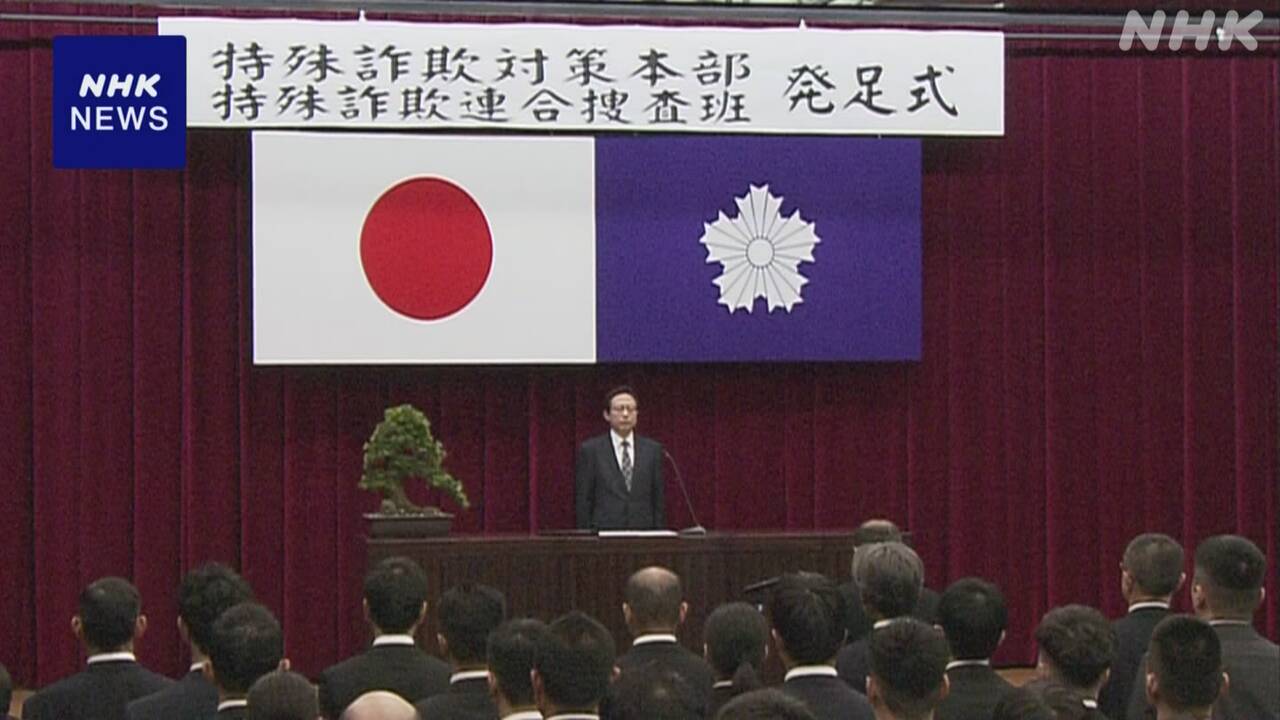The police's special fraud investigations have undergone major changes since April, with a new system called the ``Union Investigation Team'' established in police departments across the country. The aim is to shift away from the ``locality-based approach,'' in which the police in the area where the damage occurred is responsible for everything from the initial response to the arrest of the perpetrators. The plan is to take action against them and strengthen efforts to crack down on them.
This month, a ``Special Fraud Coalition Investigation Team'' was launched by police forces across the country.
Approximately 500 investigators have been assembled from the Metropolitan Police Department, which has a dedicated investigative team of approximately 200 people, and the police departments of seven prefectures that have jurisdiction over major cities. A contact point has been established for collaboration across borders.
Traditionally, the basis of special fraud investigations has been the ``location-of-occurrence principle,'' in which the police in the area where the damage occurred is responsible for everything from the initial response to the arrest of the culprit, just as in the case of other crimes.
Investigators are required to travel for long periods of time to areas such as the Tokyo metropolitan area where fraud centers and suspects live, and to travel back and forth over long distances, but this is difficult for local police departments with limited manpower. The burden was increasing.
The new "Union Investigation Team" will be led by police in seven prefectures with assigned investigators, and will conduct initial investigations, identify parties involved in incidents, and investigate perpetrators upon request from police in areas where damage has occurred. I will lead the process up to the arrest.
Motoo Morishita, head of the National Police Agency's Organized Crime Countermeasures Division 2, said, ``Until now, it was difficult to deal with the wide-area nature of special fraud, but with the new combined investigation team, police forces from all over the country can request each other to investigate.'' This framework can be expected to speed up and improve the efficiency of investigations.The police can use their collective strength to arrest as many cases as possible against criminal groups whose members are recruited through SNS and move around the country. I want to do that.''
Specific cases of investigations based on the “place of origin principle”
Last year, there was a case in which a woman in her 80s in Miyazaki Prefecture was defrauded of approximately 50 million yen in cash by a special scam phone call pretending to be a lawyer.
According to the woman, the fraud group stoked her fears by saying, ``It is illegal to lend your name to a welfare facility applicant who agreed to do so over the phone,'' and instructed her to send cash by courier. He withdrew cash 46 times over a two-month period and sent it to the specified destination in Tokyo.
Miyazaki Prefectural Police are investigating a fraud group that deceived women and have arrested 13 suspects so far.
According to Miyazaki Prefectural Police, the 13 suspects discovered during the investigation lived in the Kanto region, which is far away from Miyazaki, including Tokyo, Kanagawa, and Tochigi.
Investigators often flew back and forth between Miyazaki and the Kanto region in order to mark the suspect's movements and figure out where he stopped, and sometimes their business trips were long.
A series of investigations led to the arrest of the person in charge of directing the investigation, but the long-term investigation in a place with which he was unfamiliar brought with it a burden and mental pressure.
Superintendent Takahiro Morishita of the Miyazaki Prefectural Police Headquarters, who was in command of the investigation headquarters, said, ``It took a considerable amount of time just to travel, and there was a time lag in the investigation.If we could reduce the number of people traveling, we would be able to investigate other cases within the prefecture.'' "We can also focus on investigating victims from other prefectures. Conversely, if we receive a request from another prefecture, we will respond to victims anywhere in the country, so we hope that this new system will lead to the arrest of as many criminals as possible."
Number of people arrested: Seven prefectures account for 75% of the total
According to the National Police Agency, 19,033 cases of special fraud were confirmed nationwide last year, the highest number in 15 years, and the total amount of damage was more than 44.1 billion yen, more than 7 billion yen more than the year before. I am.
Last year, 2,499 people were arrested on suspicion of being involved in special fraud, of which 1,909 people had their residences determined.
Breaking it down by prefecture, Tokyo had the most people with 461 people, followed by Kanagawa with 215 people, Saitama with 208 people, Osaka with 194 people, Chiba with 193 people, Aichi with 111 people, and Fukuoka with 57 people. Prefectures account for 75% of the total.
The ``Special Fraud Coalition Investigation Team'' has 500 full-time investigators assigned to police departments in these seven prefectures.

